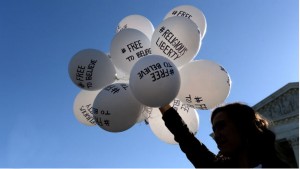Home » Commentary » Opinion » Religious freedom is a tricky thing
· Ideas@TheCentre
 Two weeks have passed since the controversy over Hurstville Boy’s Campus of Georges River College agreeing to a protocol allowing Muslim students not to shake hands with women.
Two weeks have passed since the controversy over Hurstville Boy’s Campus of Georges River College agreeing to a protocol allowing Muslim students not to shake hands with women.
A proper understanding of religious freedom suggests the school did the right thing and its critics are mistaken.
Freedom of religion is not just the freedom to believe but also, in the words of Article 18 of the International Covenant on Civil and Political Rights (ICCPR),the freedom “to manifest [ …] religion or belief in worship, observance, practice and teaching.” In this case, if there is a way to accommodate the manifestation of the religious views of the young men, why shouldn’t it be done?
The views in question may be strange even to mainstream Islam. But religious freedom never depended on the reasonableness of the religion involved. Nor is it any good to assert that giving in at this point is the thin edge of a ‘sharia’ wedge. Religious freedom is not absolute. It is, as the ICCPR asserts, subject to such limitations that are “necessary to protect public safety, order, health or morals or the fundamental rights and freedoms of others.” No sharia.
But is it sexist? Maybe, but in itself that is not a reason to deny religious freedom. And having an agreed protocol manages the risk of misunderstanding and substitutes another gesture of respect.
Government schools are essentially secular institutions, but they are not secularist imposing an Australian version of a French hard line laïcité — a core concept in France’s constitution, Article 1 of which states that the country is a secular one.
The School need not be criticised, but like any religion, Islam certainly can be. The right to religious freedom is not the right to be free from criticism or even ridicule. Something often goes wrong when Islam is discussed. The left forget their abhorrence of sexism, and others can lose their passion for freedom.
Religious freedom is a tricky thing